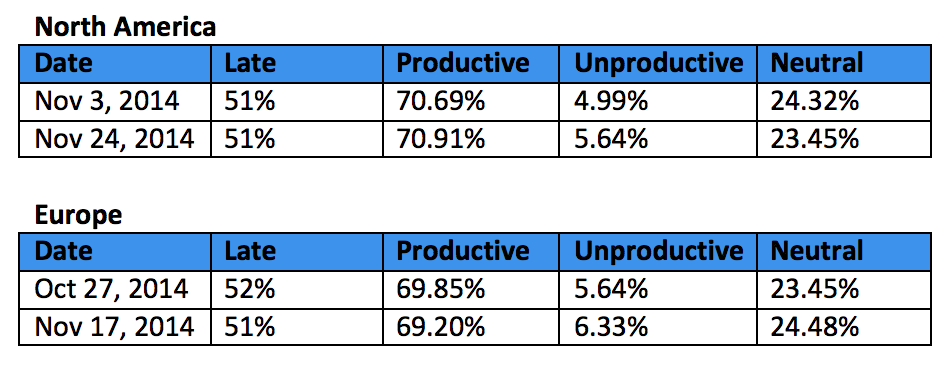Daylight Savings is Over – What Does it Mean for Productivity?

Daylight savings is ending in many parts of the world and people are moving their clocks back an hour. While we may rejoice in an extra hour of sleep, how does this time change affect our productivity? And how can we stay motivated now that it’s getting darker earlier in the day?
Want to get the most out of your time?
Try DeskTime for free!
Try free for 14 days · No credit card required.
By signing up, you agree to our terms and privacy policy.

Research shows that moving clocks forward in the spring costs the economy money and productivity. Losing an hour of sleep means that more people are late the Monday after daylight savings and they “cyberloaf” most of the day anyway (meaning they pretend to be working on the computer while really browsing for fun).
If moving the clock forward an hour results in lateness and lost productivity, what happens when we gain that hour back in the fall? Does one more hour of sleep lead to more work done? Or does a darker evening make it harder to stay focused?
According to DeskTime’s data, switching the clocks isn’t as dramatic as it’s made out to be. We looked at stats from the Monday after the DST switch and compared with the Monday 3 weeks after the switch. We found that nothing much changes.

Our data shows that productivity isn’t really impacted when the clocks are pushed back (there isn’t much change when the clocks move forward in the spring, either). Overall time spent on productive tasks throughout the day hovers around 70%. Productivity levels 3 weeks later don’t change much either. Roughly 50% of people showed up late the Monday after DST changes, and the same amount of people were late 3 weeks later. This suggests that the initial extra hour of sleep and decreased daylight hours won’t affect workplace productivity.
Keeping Spirits Bright
Regardless of performance at work, shorter daylight hours can affect personal productivity and happiness. An estimated 14% of people in the U.S. experience the “winter slump,” a feeling of lethargy and general ennui in the cold, dark months. It typically starts in October and lasts until springtime. Specific reasons for this are being debated, but many scientists speculate that a lack of daylight messes with circadian rhythms, and less sunlight makes the body produce more melatonin, which can cause drowsiness.
Even if productivity at work isn’t a problem, your happiness and mood take a hit. And now that clocks are an hour behind, the darker months are here and you might start to feel the onset of the winter blues. This is what we recommend you do to survive until the spring:
- Exercise
On top of being good for you physically, exercise does wonders for your mental health and it’s often recommended as a natural cure for depression. Get an endorphin rush, feel energized, and avoid weight gain that sometimes comes in the winter months.
- Socialize
No matter how much you don’t feel like leaving the comfort of your home to go out and meet friends, do it! Studies suggest that socializing improves longevity, and sharing a laugh with friends is always a good way to boost your mood.
- Take Vitamin D Supplements
Vitamin D is essential for bone health and most people don’t get enough in the winter. 15 minutes of sunlight on bare skin every day is considered the minimum amount needed, which is hard to achieve when it’s dark in the mornings before work, and dark on your way home. A Vitamin D deficiency can lead to muscle and joint pain, fatigue, and depression, so taking supplements can alleviate these symptoms.
- Get Outside
Temperatures may be sub-zero and the desolate landscape looks less than inviting, but force yourself to step outside and enjoy the fresh air for a while. Try going for a brisk walk in the morning, when you can still get a bit of sunshine. Plus, there are loads of activities that you can only do this time around. Go skiing, skating, and enjoy the bright colors as the leaves turn. Fresh air and fun, what’s not to love?
- Indulge
Hot chocolate, mulled wine, hearty soups – these are especially delicious in the fall and winter. So indulge in some hot food to make you feel warm and fuzzy. Hey, it’s the little things that make a difference!
While your performance at work might not change too drastically in the dark months ahead, your personal productivity and motivation can. Try our suggestions and don’t worry, spring is just 6 months away.
Did you find this article useful? Give it a clap!
Psst! You can clap more than once if you really loved it 🙂